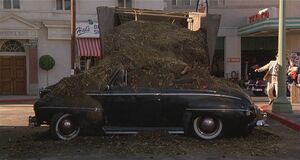Isn't the golden rule in all science to keep all hypotheses on the table until they have been proven wrong? Seems a bit contradictory to have so many fanatics ranting about skeptics with such hostile criticism when they expect complete understanding of their scientific theories.
In all seriousness, you need to wake ... up. I know you're all probably fifteen year old narcissists (you're not?) who don't give a damn about the unforeseen consequences of changing the energy use of 6 billion people (either because your adolescent brain can't extrapolate beyond the now or because you're banking on the genius of mankind which has never ever created a flawed solution to a previous problem.
ever.), but shouldn't you at least stop and consider the alternative:
what if your wrong? That is, what if your tiny project with tiny consequences/byproducts gets multiplied to create 6 billion people's worth of consequences and byproducts? Not only have you screwed your friends and family, your children and their children, but you've also screwed billions of other people you don't even know.
 The heart is a nice touch, but I don't think it's enough.
The heart is a nice touch, but I don't think it's enough.
For instance, the automobile and its use of carbon energy came at an age when...:
Quote:
“In New York City alone at the turn of the century [ed.- 1900 not 2000], horses deposited on the streets every day an estimated 2.5 million pounds of manure [ed.- SHI*T!]and 60,000 gallons of urine, accounting for about two-thirds of the filth that littered the city’s streets. Excreta from horses in the form of dried dust irritated nasal passages and lungs, then became a syrupy mass to wade through and track into the home whenever it rained. New York insurance actuaries had established by the turn of the century that infections diseases, including typhoid fever, we much more frequently contracted by livery stable keepers and employees than by other occupational groups, and an appeal to the Brooklyn Board of Health to investigate resulted in the institution of new municipal regulations on stables, compelling more frequent removal excreta and disinfecting of premises. Medical authorities stated that tetanus was introduced into cities in horse fodder and that an important cause of diarrhea, a serious health problem among children at the time, was ‘street dust’ consisting in the main of germ-laden dried horse dung. The flies that bred on the ever present manure heaps carried more than thirty communicable diseases... About 15,000 dead horses were removed from the streets of New York each year.”
- James Flink, The Automobile Age (Cambridge, MA: The MIT Press, 1993), p. 136.
|
 This is a scene from an old movie, but the gist of it is "I hate manure!"
This is a scene from an old movie, but the gist of it is "I hate manure!"
Well now, that savior of old is the new harbinger of doom. So, don't blame me for being less enthusiastic about man's ability to create a completely clean, by-product-free, consequence-free solution for the entire planet Earth. But, I don't know, maybe we're smarter now than we've ever been before?
 Hi, remember me? I invented the helicopter, the tank, and solar power... in the 1490's.
Hi, remember me? I invented the helicopter, the tank, and solar power... in the 1490's.
Oh snap.